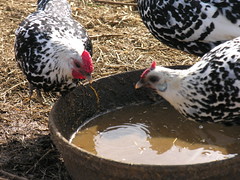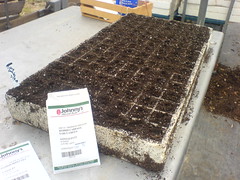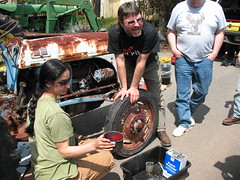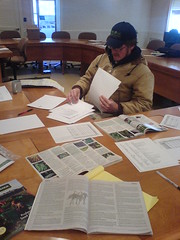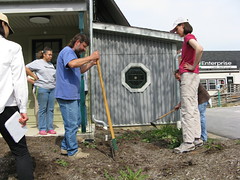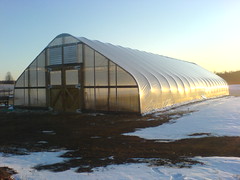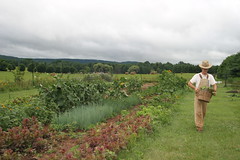Are you ready to take your gardening and farming skills to the next level? Join us April 3-5 for an exciting intensive workshop that will provide strategies and experiences for designing a more purposeful food production system. Farming consultant and trainer Shane J. LaBrake will share his holistic approach to small-scale agriculture, including field-based exercises using hand tools. This course is designed for emerging and intermediate growers who want to explore new ways to match their skills with appropriate scale in order to move toward greater sustainability. There’s still time to register—you won’t want to miss "Skills, Scale, Sustainability"!
Monday, March 30, 2009
Thursday, March 26, 2009
The Integrated Homestead, April 17-18
The joys of cover cropping. Chickens as shredders and composters. Using cultivated fungi in the homestead. Where can you learn about these diverse topics and more? At the Local Food Project’s upcoming workshop starring local homesteading guru Harvey Ussery—“The Integrated Homestead: Elaborating the Theme.” On April 17 and 18 Harvey will build on his presentation from 2008 and provide a more in-depth look at specific homestead projects—from seed starting and transplanting, to vermicomposting and setting up a multifunctional greenhouse. You won’t want to miss this fun and informative event. Learn more and register today!
Labels:
programming,
spring,
systems,
The Integrated Homestead
Tuesday, March 24, 2009
Starting Broccoli and Cabbage
The Local Food Project crew spent an afternoon starting seeds for our first spring field crops—cool weather-loving broccoli (Gypsy and De Cicco) and cabbage (Gonzales). After filling flats with dark, fluffy potting mix, we poked shallow holes in the center of all 128 cells. We dropped in the tiny round seeds by ones and twos, then carefully tucked them, covering them with a light layer of potting mix. After a gentle watering, we set the flats atop heating mats, which will give the seeds an extra boost of warmth as they work to put out roots and sprout. We’ll be starting more seeds in the days and weeks to come and transplanting day will be here before we know it!
Wednesday, March 18, 2009
Real-Life Skills and Knowledge for Aspiring Farmers
The Local Food Project’s next event—“Skills, Scale, Sustainability”—will offer an exciting blend of farm design theory and hands-on learning. Facilitator Shane J. LaBrake is known for his unique approach to farmer training, emphasizing the importance of both management and practical skills.
Join us on April 3-5 to learn strategies for creating a farm plan that really works, communicating on the farm and at the market, and navigating the twists and turns of each season. You’ll also have the chance to get your hands dirty and become better acquainted with handtools for the small farm, tractor basics, and scale-appropriate field design. There are only 24 spots available in this unique intensive seminar. Register today!
Labels:
programming,
Skills Scale Sustainability,
spring,
systems,
tools
Monday, March 16, 2009
Some New Varieties for 2009
We placed the last of our seed orders for the summer season and the Local Food Project crew is looking forward to harvesting some old favorites like Ermosa lettuce, Sun Gold cherry tomatoes, and Sweet Chocolate peppers. We’re also excited to try out some new varieties this year—red and purple speckled Scarlet Runner bean, bumpy blue Marina di Chioggia pumpkin, blackish purple Nyagous tomato, and other unique vegetables, flowers, and herbs we can’t wait to try and share!
Thursday, March 12, 2009
Skills, Scale, Sustainability
How can you find greater success in your small-scale agricultural endeavors? Join the Local Food Project for a new course on April 3-5 and take home a wealth of proven strategies and hands-on skills that will help you refine your food production system. During “Skills, Scale, Sustainability”—a 3-day intensive immersion workshop for aspiring and experienced growers—agricultural consultant Shane J. LaBrake will combine sustainable farming philosophy with practical training and problem solving.
“As we consider small farm design, we’ll address real life skills and knowledge that aspiring need to know,” says Shane. Read more on our website and register early to secure your space in this essential course for small-scale growers.
“As we consider small farm design, we’ll address real life skills and knowledge that aspiring need to know,” says Shane. Read more on our website and register early to secure your space in this essential course for small-scale growers.
Labels:
programming,
Skills Scale Sustainability,
spring,
systems,
tools
Tuesday, March 10, 2009
Winter’s Hanging On
The Local Food Project garden got a blanketing of fresh powder last week, reminding us that despite all of our plans for spring, it’s still winter. The hoophouse withstood the storm well, staying warm and dry inside while snow piled up around its edges. The peace and quiet of our little section of Airlie encouraged a moment to reflect on the success of the season behind us and look forward to a bountiful 2009.
Wednesday, March 4, 2009
Explore Creative Land Partnerships on March 11 and 25
What does a thriving small farm look like? Maybe it’s a few acres of heirloom vegetables near a bustling community with a successful farmer’s market. Or perhaps it’s a more remote grass-fed beef enterprise with a commitment to producing the best-tasting meats for miles around. It could also be a small-scale pastured poultry operation with a solid base of dedicated customers. The possibilities are virtually limitless.
Landowners who want to support and be a part of a flourishing farm operation, but don’t want to do the farming themselves have the option to host a small farm project on their land. The Local Food Project’s upcoming course—“Hosting the Small Farm Dream”—will guide participants through the decision-making process and explore options for creative land partnerships. The course will take place on two Wednesday evening sessions (March 11 and 25) from 6:30-9 p.m. at Airlie Center. Learn more and register today!
Landowners who want to support and be a part of a flourishing farm operation, but don’t want to do the farming themselves have the option to host a small farm project on their land. The Local Food Project’s upcoming course—“Hosting the Small Farm Dream”—will guide participants through the decision-making process and explore options for creative land partnerships. The course will take place on two Wednesday evening sessions (March 11 and 25) from 6:30-9 p.m. at Airlie Center. Learn more and register today!
Monday, March 2, 2009
Prepping for Spring Greens
The Local Food Project hoophouse is really heating up! Cold temperatures and whipping winds remind us it’s still winter out in the field, but it certainly feels like spring inside the hoophouse. To get ready for our first planting of greens, we’re clearing out weeds, raking beds smooth, and giving the soil a nice deep soaking. In a few days, we’ll pull out any newly germinated weeds seeds, then begin sowing rows and rows of fresh spring greens.
Subscribe to:
Posts (Atom)


